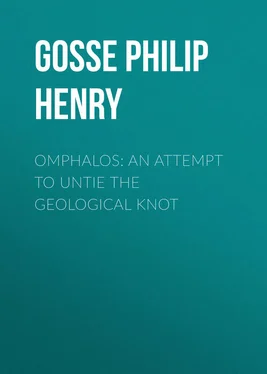Philip Gosse - Omphalos - An Attempt to Untie the Geological Knot
Здесь есть возможность читать онлайн «Philip Gosse - Omphalos - An Attempt to Untie the Geological Knot» — ознакомительный отрывок электронной книги совершенно бесплатно, а после прочтения отрывка купить полную версию. В некоторых случаях можно слушать аудио, скачать через торрент в формате fb2 и присутствует краткое содержание. Жанр: Биология, foreign_antique, foreign_prose, на английском языке. Описание произведения, (предисловие) а так же отзывы посетителей доступны на портале библиотеки ЛибКат.
- Название:Omphalos: An Attempt to Untie the Geological Knot
- Автор:
- Жанр:
- Год:неизвестен
- ISBN:нет данных
- Рейтинг книги:3 / 5. Голосов: 1
-
Избранное:Добавить в избранное
- Отзывы:
-
Ваша оценка:
- 60
- 1
- 2
- 3
- 4
- 5
Omphalos: An Attempt to Untie the Geological Knot: краткое содержание, описание и аннотация
Предлагаем к чтению аннотацию, описание, краткое содержание или предисловие (зависит от того, что написал сам автор книги «Omphalos: An Attempt to Untie the Geological Knot»). Если вы не нашли необходимую информацию о книге — напишите в комментариях, мы постараемся отыскать её.
Omphalos: An Attempt to Untie the Geological Knot — читать онлайн ознакомительный отрывок
Ниже представлен текст книги, разбитый по страницам. Система сохранения места последней прочитанной страницы, позволяет с удобством читать онлайн бесплатно книгу «Omphalos: An Attempt to Untie the Geological Knot», без необходимости каждый раз заново искать на чём Вы остановились. Поставьте закладку, и сможете в любой момент перейти на страницу, на которой закончили чтение.
Интервал:
Закладка:
Have they succeeded? If I thought so, I would not publish this book. Many, I doubt not, have been convinced by each of the schemes by which the discrepant statements have been sought to be harmonized. Each of them has had sufficient plausibility to convince its propounder; and, probably, others too. And some of them have attained a large measure of public confidence. Yet if any one of them is true, it certainly has not commanded universal assent. Let us examine how far they agree among themselves, who propose to reconcile Scripture and Science, "the Mosaic and the Mineral Geologies."
And first, it is, perhaps, right to represent the opinions of those who stand by the literal acceptation of the Divine Word. There have been some, indeed, who refuse to entertain the question of reconciliation, taking the high ground that, as the Word of God is and must be true, it is impious to set any evidence in competition with it. I cannot but say, my sympathies are far more with these than with those who, at the opposite pole of the argument, would make scientific deduction paramount, and make the Word go to the wall. But, then, we ought to be quite sure that we have got the very Word of God; and, so far from being impious, it seems highly proper and right, when conflicting evidence appears to flow out of what is indubitably God's work , to examine afresh the witnesses on both sides, that we may not make either testify what it does not.
Those good men who merely denounce Geology and geologists, I do not quote. There are the facts, "written and engraven in stones," and that by the finger of God. How can they be accounted for?
Some have recourse to the assumption that the natural processes by which changes in the earth's surface are now going on, may have operated in antediluvian times with a rapidity and power of which we can form little conception from what we are cognisant of. The Rev. J. Mellor Brown takes this ground, adducing the analogies of steam-power and electricity, as effecting in a few moments or hours, what formerly would have required several days or weeks to accomplish.
"God's most tremendous agencies may have been employed in the beginning of his works. If, for instance, it should be conceded that the granitic or basaltic strata were once in a state of fusion, there is no reason why we should not call in the aid of supposition to produce a rapid refrigeration. We may surround the globe with an atmosphere (not as yet warmed by the rays of the newly kindled sun) more intensely cold than that of Saturn. The degree of cold may have been such as to cool down the liquid granite and basalt in a few hours, and render it congenial to animal and vegetable life; while the gelid air around the globe may have been mollified by the abstracted caloric." 3 3 Reflections on Geology.
A writer in Blackwood (xli. 181; xlii. 690), in like manner, adheres to the literal sense of Genesis and the Decalogue, and alludes to "the great agencies – the magnetic, electrical, and ethereal influences – probably instrumental in all the phenomena of nature," as being far more powerful than is generally suspected.
Mr. Macbrair – who does not, however, appear, from the amount of his acquaintance with science, competent to judge of the physical evidence – supposes stratification to have proceeded with immense rapidity, because limestone is now deposited in some waters at the rate of six inches per annum. Because a mass of timber, ten miles in length, was collected in the Mississippi, in thirty-eight years, he considers that a "capital coal field" might be formed in a single century. Alluvial strata are mud lavas ejected from volcanoes. The whole difficulty of fossil remains is got rid of by ignoring the distinctions of species, and assuming that the ancient animals and the recent ones are identical. The Pterodactyle and the Plesiosaurus he does not allude to. 4 4 Geology and Geologists.
According to Dr. Ure, – "The demiurgic week … is manifestly composed of six working days like our own, and a day of rest, each of equal length, and, therefore, containing an evening and a morning, measured by the rotation of the earth round its axis… Neither reason nor revelation will justify us in extending the origin of the material system beyond six thousand years from our own days. The world then received its substance, form, and motions from the volition of the Omnipotent."
His theory of the stratification extends over the whole antediluvian era. He supposes that successive irruptions of the central heat broke up the primitive strata and deposited the secondary and tertiary. "The basaltic or trap phenomena lead to the conclusion that such upheavings and subversions were not confined to one epoch of the antediluvian world, but that, coeval with its birth, they pervaded the whole period of its duration… The Deluge – that universal transflux of the ocean – was the last and greatest of these terraqueous convulsions." 5 5 New System of Geology.
Another class of this school of interpreters refers the stratification of the earth, either to the deluge alone, or to that convulsion conjoined with the one which is considered to have taken place on the third day of the Mosaic narrative. Perhaps the most eminent writer of this class is Mr. Granville Penn, whose opinions may be thus condensed.
He supposes that this globe has undergone only two revolutions. The first was the violent rupture and depression of the surface to become the bed of the sea, and the simultaneous elevation of the other portion to become dry land, – the theatre of terrestrial existence. This first revolution took place before the creation of any organized beings. The second revolution was at the Noachic Flood, when the former bed of the sea was elevated to become the dry land, with all its organic accumulations of sixteen centuries, while the former land was correspondingly depressed and overflowed. "The earth must, therefore, necessarily exhibit manifest and universal evidences of the vast apparent ruin occasioned by its first violent disruption and depression; of the presence and operation of the marine fluid, during the long interval which succeeded; and of the action and effects of that fluid in its ultimate retreat." 6 6 Mineral and Mosaic Geologies, p. 430.
Mr. Fairholme 7 7 Geology of Scripture.
so nearly agrees with the above, that I need not quote his opinions in detail.
Another class, represented by Dr. Young and the Rev. Sir W. Cockburn, Dean of York, have maintained with considerable power, backed by no mean geological knowledge, that the deluge is a sufficient vera causa for the stratification of the globe, and for the fossilization of the organic remains.
Dr. Young supposes that an equable climate prevailed all over the globe in the antediluvian period. "Were the highest mountains transferred to the equatorial regions, the most extensive oceans removed towards the poles, and fringed with a border of archipelago, – while lands of moderate height occupied most of the intermediate spaces, between these archipelagos and the equatorial mountains; then a temperature, almost uniform, would prevail throughout the world." This "perpetual summer" would account for the prodigious quantities of animal and vegetable remains: – every region teemed with life.
At the Flood, "the bed of the ocean must have been elevated, and the dry land at the same time depressed," an expansive force acting from below to heave up the ocean's bed. To this agency are attributed the vast masses of granite, gneiss, basalt, and other rocks of igneous origin, which seem to have been forced upwards in a state of fusion, into their present lofty stations. The ancient bed of the ocean may have consisted of numerous layers of sand, clay, lime, and other substances, including corals and marine shells, – to a certain degree consolidated into rocks. By the progressive rising of the waters and the currents so made, fresh materials would be conveyed to the depths of the ocean, so that the magnesian limestone, the saliferous beds, the lias, &c., would be deposited. 8 8 Scriptural Geology, passim.
Интервал:
Закладка:
Похожие книги на «Omphalos: An Attempt to Untie the Geological Knot»
Представляем Вашему вниманию похожие книги на «Omphalos: An Attempt to Untie the Geological Knot» списком для выбора. Мы отобрали схожую по названию и смыслу литературу в надежде предоставить читателям больше вариантов отыскать новые, интересные, ещё непрочитанные произведения.
Обсуждение, отзывы о книге «Omphalos: An Attempt to Untie the Geological Knot» и просто собственные мнения читателей. Оставьте ваши комментарии, напишите, что Вы думаете о произведении, его смысле или главных героях. Укажите что конкретно понравилось, а что нет, и почему Вы так считаете.












